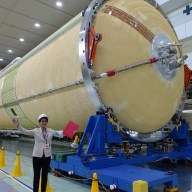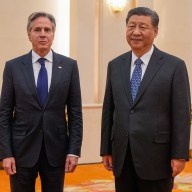TORONTO – Some of Canada’s former prime ministers did a little armchair quarterbacking on how the economy is being handled Tuesday as they convened for a taping of the CBC reality show, “Canada’s Next Great Prime Minister.”
Former Liberal prime minister Paul Martin complained Stephen Harper was too slow in bringing forward a stimulus package, saying the government should have acted before Christmas.
“I think the situation is very worrisome and I think that when you see these job numbers it’s a pity that we didn’t begin with the stimulus much earlier,” Martin said of a $40-billion plan MPs approved in principle last week.
“The quicker you get at this kind of thing, the better off you are. I also think it’s very important the kind of stimulus that you engage in.”
Meanwhile, Brian Mulroney expressed skepticism over Bank of Canada governor Mark Carney’s prediction the economy will pick up next year.
“While I hope he’s right, I find it somewhat optimistic,” said Mulroney, who grappled with a massive deficit that amounted to 8.7 per cent of the GDP when he took over from Pierre Trudeau in 1984.
“I think it’ll be rather longer, somewhat longer than what people on the optimistic side are talking about but not the dreadful depression that others mention. Somewhere in the middle.”
“We’ve got, unquestionably, a rough couple of years ahead of us. Unquestionably.”
Mulroney and Martin joined former leaders Kim Campbell and Joe Clark in grilling four young political junkies on what they would do if allowed to govern.
The one-hour special, hosted by Alex Trebek, airs on CBC-TV on March 18.
The winner of the reality show gets $50,000 and a six-month paid corporate internship. The remaining three finalists each receive $5,000 and three-month internships.
Backstage, the economy was top of his mind for Martin.
Martin bemoaned the Conservative government’s handling of federal coffers, suggesting it had squandered budget surpluses his Liberal government had left behind. Harper has projected deficits of $34 billion and $30 billion over the next two years as he copes with the recession.
“The problem with that deficit is that half of it has nothing to do with stimulus – half of it was an inheritance of some of the decisions that have been taken over the last two years,” said Martin, who ended deficit spending when he was finance minister in the 1990s and left behind a $12-billion surplus when the Tories took office in 2006.
“That’s what’s worrisome, that’s the kind of thing that builds a structural deficit that you don’t get out of. That’s not stimulus spending.”
“Stimulus spending we understand. Going into a deficit when you don’t have to, that’s difficult to accept.”
A spokesman for the Prime Minister’s Office questioned why Martin waited until after the budget was introduced before speaking out.
Clark complained that the Canadian package focused too narrowly on internal woes. He called for investment in developing countries in the Caribbean and Africa, saying the worldwide economic slump will devastate impoverished countries and destabilize already delicate regions.
“I’m really talking about where our sense of responsibility is,” said Clark, who has recently been doing development work in Africa.
“I’m not saying we have to help others out just because they’re in trouble, I’m saying we have to help out others who are in trouble because that’s a way of making our whole world situation stronger.”
The shortlived Tory prime minister, who led from 1979 to ’80, praised the Japanese stimulus package for putting funds towards developing countries in Asia.
“I’m not saying that Canada has to come in and be the only person helping there but historically what Canada has done on issues of this kind is be the leader in gathering others together, recognizing that often the poor world gets hit harder by crisis than the richer world.”
















